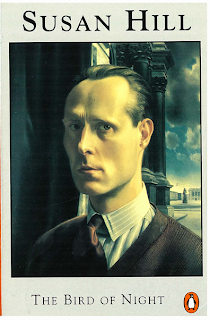Although I’ve been reading Booker Prize shortlisted novels for quite a few years, I am glad that in August last year I decided to start a blog and like any true manic began my Booker Prize journey by reading each shortlist from the inaugural year, 1969, onwards, in order of course!!!! This would mean re-reading some, attempting for the umpteenth time others, but it would also mean discovering gems amongst the rubble. Why am I grateful I began this journey? Well, the 1971 shortlist threw up the wonderful “Mrs Palfrey at the Claremont” by Elizabeth Taylor and now the 1972 list has given me “The Bird of Night” by Susan Hill. Novels hard to track down, forgotten even, and without this exercise, ones I surely would not have sought out, but novels that this journey has given me the pleasure of discovering.
“The Bird of Night” is a dark, bleak tale of Francis Croft, World War One veteran and “the greatest poet of his age” who is mad. This short novel is written as a reflective journal by Francis’ partner Harvey Lawton, old, invalid, reclusive and hounded by researchers and biographers all wanting to resurrect the life of Francis. The journal style quickly called to mind Sebastian Barry’s 2011 long listed “On Canaan’s Side”;
Bill is gone.
What is the sound of and eighty-nine-year-old heart breaking? It might not be much more than silence, and certainly a small slight sound.
or the 2005 Pulitzer Prize winning “Gilead” by Marilynne Robinson
I told you last night that I might be gone sometime, and you said, Where, and I said, To be with the Good Lord, and you said, Why, and I said because I’m old, and you said, I don’t think you’re old. And you put your hand in my hand and you said, You aren’t very old, as if that settled it.
Both journals written by the old, reflecting upon their lives. I also drew parallels to Alan Hollinghurst’s 2011 long listed “The Stranger’s Child” which explored the life of homosexual war poet Cecil Valance and his literary and personal impact across generations and (of course the) biographers coming to call. Throw in the subject of madness, which was explored by Bernice Rubens with her Booker winning “The Elected Member” from 1970. Or mix in the country setting of J.L. Carr’s shortlisted “A Month in the Country” from 1980 (a tale of World War 1 veteran employed to restore a mural in a country church) and I suddenly had a plethora of similar material which I have read (and reviewed some of them here) over the last nine months.
However this is so much more than a tale of poetry and madness:
But understanding was not control. If Francis knew what he was, he could not alter it, he had no power at all over the vagaries and eruptions of his own mind. He was helpless in the face of an attack of insanity, no matter which way it went with him, whether he was depressed or violent, whether he was hysterical, agitated or deluded by visions and voices.
It is also a story of relationships, the giving of oneself to another, but at what cost? And for what reasons? This is also a tale of England nostalgically coming to terms with life post World War One, of subtle melancholic references to their obviously homosexual relationship together and of reflections of better times. We know the outcome of Francis’ journey into madness before our journey begins and the genuine remorse that our narrator must feel becomes even more pertinent as he observes and fights the deepening madness and depression of his lover.
A section I particularly liked was Francis reading the reviews of his “greatest work”:
Even those who praised him the most extravagantly had sometimes ‘no idea’, they thought they understood him but they did not; they either read into the poem much that was not there, or else missed much that was.
Is this Susan Hill having a dig at critics of her previous work? Or her reference to the great mind of Francis being reduced to reading two or three Detective novels in a sitting (in recent years Susan Hill has written a series of crime novels featuring detective Simon Serrailler). She may also be playing with our minds with her 2006 comment; “A novel of mine was shortlisted for Booker and won the Whitbread Prize for Fiction. It was a book I have never rated. I don't think it works, though there are a few good things in it. I don't believe in the characters or the story.”Interestingly this quote is referenced in a number of reviews of “The Bird of Night” on the internet; however the archive of Susan Hill’s blog where it was supposedly taken no longer exists.
A bleak, depressing but enjoyable and easy read which I thoroughly enjoyed after the slog of the winner from the same year “G”.
Cross posted at my blog.

Tony, I'm so enjoying being introduced to all these older nominees. It's a great help in choosing which books to read.
ReplyDeleteAnd I should have said, this one sounds quite good!
Delete